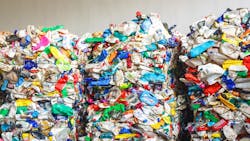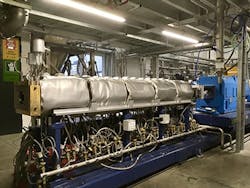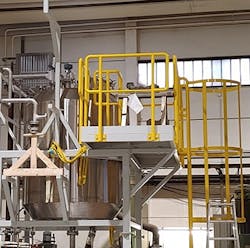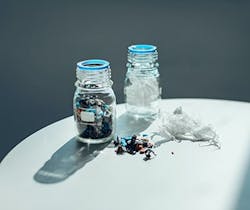Industry Breaks The Mold For Discarded Plastics
Significant advances are taking place in chemical recycling technologies for dealing with discarded plastics. In addition, waste collection collaborations needed to underpin the eventual commercialization of such technologies are progressing.
Various chemical processes under development aim to convert specific polymers back into monomers. For example, BP, London, is targeting polyethylene terephthalate (PET) with its Infinia depolymerization chemical recycling technology. Infinia breaks down PET waste into its constituent monomers. After contaminant removal and purification, the recycled terephthalic acid (PTA) and monoethylene glycol (MEG) are interchangeable with monomers produced from a traditional hydrocarbon feedstock.
More will be known about the future of the process following the commissioning of a $25-million Infinia pilot later in the year at the company’s research and development center in Naperville, Ill. If the technology can operate on a commercial and continuous basis, the company says deployment at a number of full-scale plants operating at different locations around the world is likely.
“BP Infinia technology is based on proven chemical processes which BP aims to economically operate at large scale; we believe BP’s expertise in chemical process technology development, particularly in the area of PTA production, provides us with advantages for the successful development and implementation of the BP Infinia technology,” notes a company spokeswoman.
As part of its recycling strategy, BP also is working with other companies in the polyester value chain, including Britvic, Danone and Unilever, to address setting up recycling streams and to better understand the technical implications of end-user requirements and carry out product testing.
Polystyrene Focus
Meanwhile, INEOS Styrolution, Aurora, Ill., and Agilyx, Portland, Ore., are developing a 100-t/d chemical recycling facility for polystyrene (PS) in Channahon, Ill. The plant, now at the engineering design stage, will use Agilyx’s proprietary chemical recycling technology that breaks down PS to base monomers suitable for manufacturing new styrenic polymers.
The decision to move ahead with the plant follows a successful development program with INEOS Styrolution that qualified the styrene product to the company’s specifications and identified post-consumer polystyrene feedstock for the process.
Agilyx itself has successfully concluded a year-long collaboration in artificial intelligence (AI) with GE Research, Niskayuna, N.Y. This involved assessing GE’s advanced modeling technology and its applicability to Agilyx’s database of chemical conversion of post-use plastics.
The two companies have concluded that AI, machine learning, predictive modeling technologies and other optimization tools can enable an increase in the chemical recyclability of all post-use plastics to over 95% from the current 10%.
Agilyx now is working with others in the PS supply chain to optimize the findings and expects to announce further collaborations later in 2020.
Polymethylmethacrylate
According to “Plastics Europe,” a 2017 report published by Deloitte, London, the total demand for plastics in Europe was 51 million t/y then (and growing). That generated 27 million t/y of post-consumer plastic waste, with 17 m t/y of this from packaging. Currently, collection programs in the European Union (EU) retrieve 8.5 million t/y of packaging waste, half of which is recycled. The bloc aims to recycle 50% of such waste by 2025, and reach 55% by 2030.
This has spawned several projects supported by the EU to convert polymers back into monomers. One, called MMAtwo, started in October 2018 and runs until the end of September 2022. The EU is contributing €6.66 million ($7.43 million) to the total budget of €8.93 million ($9.96 million). The project’s main objective is to construct a novel and fast-growing polymethylmethacrylate (PMMA) recycling value chain through depolymerization and recovery of a monomer grade that can be sold at 90% of virgin methylmethacrylate (MMA) price.
The small amount of PMMA currently recycled comes from production scraps recovered by mechanical recycling and then sent through a depolymerization process that relies on a molten-lead-based process.
“This works well when there is a small amount of contaminants in the PMMA to be recycled to the monomer,” says Jean-Luc Dubois, scientific director, catalysis, processes, renewables and recycling, Arkema, Colombes, France, who chairs the executive board for the project. “However, with other PMMA grades, a high amount of contaminated residues would be produced and would have to be disposed of. So, an alternative process that would avoid this issue is needed. We selected a process using a high-temperature twin-screw extruder process (Figure 1), partly because the recycling companies that would adopt the technology are more familiar with that type of process.”
Figure 1. Effort to recover PMMA focuses on use of equipment familiar to recycling companies. Source: MMAtwo.
The process itself faces a number of chemical and engineering challenges, he notes. For example, the MMA monomers could easily repolymerize in the unit; there are flammability risks because the depolymerization occurs at conditions close to the self-ignition temperature of the monomer; and impurities generated in the process may compromise the polymerization process.
One of the project’s partners currently is carrying out the conceptual design for a downstream purification sequence that can handle difficult impurities. “This is important because the final recovered MMA monomer will have two types of applications — one that demands optical quality is the same as virgin monomer and others where transparency is not needed,” adds Dubois.
The pilot demonstration of the depolymerization process is installed at project partner Japan Steel Works Europe’s facility in Dusseldorf, Germany, while pilot-scale purification will be carried out by distillation specialist Speichim, Lyon, France. The quality of the recycled MMA monomer then will be validated both by Arkema and sheet manufacturer, Delta Glass, Tholen, The Netherlands.
Polyamide And Polyurethane
Another initiative, PolynSpire, is targeting the recycling of polyamide (PA) and polyurethane (PU) using depolymerization reactions. The 48-month project started in September 2018 with a budget of €9.95 million ($11.10 million), with the EU providing €7.94 million ($8.85 million).
The 21 partners involved include five chemical companies — Repsol Quimica, Arkema, Novamont, Nurel and Kordsa — with consortium coordination provided by sustainable technology development group CIRCE, Zaragoza, Spain.
The goal of the project is developing a system prototype ready for demonstration in an industrial environment. This involves work on two novel approaches for the total depolymerization of PA and PU.
One is chemical recycling assisted by microwaves. Here, 2.45-GHz and 915-MHz sources bombard a reactor vessel containing solvent and PA or PU.
Second is chemical recycling assisted by smart magnetic materials. This involves heating catalyst, PA or PU and solvent in a reactor. The resulting monomer-containing mixture then goes through a vessel where several magnetic zones enable capture of the catalyst. Ioniqa, Eindhoven, The Netherlands, developed the technology.
“Our initial lab-scale analyses have brought very promising results for all the technologies in terms of efficiency and quality,” says project coordinator Tatiana García Armingol, director of CIRCE’s energy and environment group. “Regarding scaling up, the main challenges include: process economics; the quality of sample material used — in terms of additives, pollutants and size — and their pre-treatment requirements; and isolation of PA and PU monomers,” she adds.
Work soon will progress from the laboratory scale to the first steps of technology demonstration, García Armingol notes.
Complex Materials
The EU also is supporting a third initiative, called MultiCycle. The three-year €9.7-million ($10.82-million) — including €7.7 million ($8.35 million) from the EU — project started in 2018 and aims to deliver an industrial recycling pilot plant for fossil- and bio-based thermoplastic multilayer packaging and fiber-reinforced composites. The process uses a novel solvent-based selective extraction process that allows recovering pure plastics and additives in mixed wastes for their later reprocessing into value-added applications. It is based on CreaSolv technology from CreaCycle, Grevenbroich, Germany, which can use a solvent tailored to specific plastics.
Figure 2. Work is progressing on 25-kg/hr unit in Germany. Source: MultiCycle.
“A 25-kg/hr MultiCycle pilot plant [Figure 2] will be set up at industrial solvent handling technology firm Lömi, Grossostheim, Germany, at the end of Q2/2020,” says Elodie Bugnicourt, innovation unit leader and MultiCycle project coordinator, Iris Technology Solutions, Barcelona.
“The main challenge for the plant is the need for high versatility in order to recover different polymers from packaging and automotive origins, as well as glass and carbon fibres. In consequence, advanced monitoring techniques are being used by Iris Technology Solutions to identify the composition of each incoming batch of end-of-life material to ensure the process is set up optimally for the fractions to be recovered,” she adds.
Several project partners will evaluate the recycled raw materials for a range of packaging and automotive applications.
Experience with the pilot plant has solved most of the basic engineering and process challenges that would arise on scale up to commercial operation, Bugnicourt believes.
“However, it would, of course, bring challenges familiar to those involved in industrial process design. In terms of process monitoring, additional inline analytical technologies are being implemented to monitor the dissolution and recovered polymers from it and ensure a constant and optimal quality. Further automation may also be introduced in the future,” she notes.
Synthetic Crude
Meanwhile, Neste, Espoo, Finland, has set itself the target of recycling more than one million t/y of post-consumer waste from 2030 onwards. To achieve this, the company is working on projects with polymer recycler and distributor Ravago, Luxembourg, and recycling specialist Remondis, Lünen, Germany. Process details and investment in the two facilities remain guarded.
Both involve construction of 200,000-t/y plants that will use Neste’s thermochemical liquefaction process to convert the plastic waste into a material similar to crude oil. Following refining and upgrading in Neste’s existing refineries, this synthetic crude then can be converted into raw materials for new plastics, chemicals and fuels.
“The key challenge related to developing chemical recycling capacity is that we need to develop value-chain partnerships, business models, technologies and eventually also facilities — but without fully confirmed financial and regulative frameworks to support investments into this area,” notes Heikki Färkkilä, Neste’s vice president, chemical recycling.
Figure 3. Chemical recycling may enable dealing with discarded materials including multi-material ones not suitable for mechanical recycling. Source: Neste.
The main technical hurdle is to develop a capability to process as broad a range of low-quality plastics as possible (Figure 3) to complement mechanical recycling technologies and still produce suitable feedstocks for high-quality chemical products, he adds.
However, Färkkilä stresses that the regulatory framework around chemical recycling still is being formed both at the EU level and in many member states. So, Neste and other players are helping the regulators more thoroughly understand the concept of chemical recycling.
“We highlight how chemical recycling is not replacing mechanical recycling; instead, it can complement mechanical recycling by enabling recycling of those plastics that currently cannot be recycled mechanically. Being able to efficiently recycle, for example, multi-material, multi-layer and colored plastics with chemical recycling could significantly contribute to increasing plastic recycling rates and reaching ambitious EU level recycling targets,” he explains.
Circular Focus
Sabic, Sittard, The Netherlands, is committed to increasing the amount of plastic it processes in Europe to 200,000 t/y by 2025. Its Trucircle strategy, announced in late 2019, spans design for recyclability, mechanically recycled products, certified circular products from feedstock recycling of plastic waste streams and certified renewables products from bio-based feedstock. The company says that it has made significant advancements in closing the loop this year via alliances with partners, customers and collaborators across the value chain.
At the heart of its strategy is Tacoil — a patented product from Plastic Energy, London — produced from recycled low-quality mixed-plastic waste otherwise destined for incineration or landfill. The process uses pyrolysis-based thermal anaerobic conversion technology to achieve this.
Sabic says that a semi-commercial plant to produce pyrolysis oil from plastic waste at its Geleen site in The Netherlands should be operational next year. Its output initially will provide materials for Sabic’s downstream collaborators but the long-term intention is to rapidly scale-up the supply of its certified circular polymers for all global customers.
About the Author
Seán Ottewell
Editor-at-Large
Seán Crevan Ottewell is Chemical Processing's Editor-at-Large. Seán earned his bachelor's of science degree in biochemistry at the University of Warwick and his master's in radiation biochemistry at the University of London. He served as Science Officer with the UK Department of Environment’s Chernobyl Monitoring Unit’s Food Science Radiation Unit, London. His editorial background includes assistant editor, news editor and then editor of The Chemical Engineer, the Institution of Chemical Engineers’ twice monthly technical journal. Prior to joining Chemical Processing in 2012 he was editor of European Chemical Engineer, European Process Engineer, International Power Engineer, and European Laboratory Scientist, with Setform Limited, London.
He is based in East Mayo, Republic of Ireland, where he and his wife Suzi (a maths, biology and chemistry teacher) host guests from all over the world at their holiday cottage in East Mayo.




